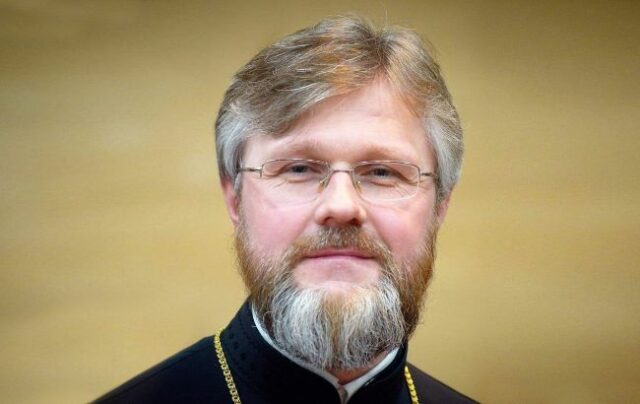### Ukrainian Orthodox Church of the Moscow Patriarchate: A Controversy Unfolds
In a troubling turn of events, a representative from the Ukrainian Orthodox Church of the Moscow Patriarchate (UOC MP) has come under suspicion for allegedly fostering religious hatred. This incident comes amid ongoing tensions in Ukraine, where faith, identity, and loyalty are deeply intertwined.
#### The Case of Archpriest Mykola Danylevych
The individual in question is Archpriest Mykola Danylevych, who serves as the deputy head of the synodal department for external church relations of the UOC MP. According to investigative reports, Danylevych has been promoting the Russian military’s actions in Ukraine and publicly urged cooperation with Russian occupiers, even calling for prayers centered on their health and well-being.
For instance, during a recent live-streamed sermon, he suggested congregation members should pray collectively for the wellbeing of «all people, including those who may occupy our land.» Such statements have sparked outrage among many Ukrainians, who view these calls as not just inappropriate, but potentially harmful in a time of conflict.
#### Connecting the Dots: Propaganda and Coordination
Evidence collected by the Security Service of Ukraine reveals that Danylevych may have been part of a larger network of UOC MP dioceses situated abroad, which were allegedly utilized to disseminate pro-Kremlin propaganda. This raises an essential question—why would a religious figure engage in such divisive rhetoric?
A study from the Institute for the Study of War highlights that misinformation often thrives in turbulent times, with religious leaders sometimes acting as conduits for dangerous ideologies. This phenomenon is not unique to Ukraine; history shows us examples where faith has been manipulated for political purposes, contributing to discord and division.
#### Real-Life Implications
The ramifications of such actions extend beyond the pulpit. For example, a community in eastern Ukraine recently experienced a surge in tension following similar narratives propagated by local religious leaders, leading to increasing polarization within families and neighborhoods. Many individuals expressed feelings of betrayal when their trusted spiritual guides promoted divisive rhetoric.
#### Expert Insights and Potential Solutions
Understanding the implications of these actions is crucial for both community cohesion and national unity. Addressing this issue requires a multifaceted approach:
— **Promoting Interfaith Dialogue**: Establishing platforms for various religious leaders to engage in open discussions can foster understanding and mitigate hate speech.
— **Educational Initiatives**: Implementing programs that educate religious communities about the dangers of propaganda and the importance of unity can empower individuals to question divisive narratives.
— **Collaborative Efforts**: Partnering with NGOs and governmental bodies can create initiatives to monitor and address hate speech in all forms, whether they arise in religious circles or elsewhere.
### Conclusion
The situation involving Archpriest Mykola Danylevych serves as a poignant reminder of the delicate interplay between religion and politics, particularly in times of conflict. As a community, it is vital to remain vigilant and advocate for compassion over division. By prioritizing unity and understanding, we can strive towards a more harmonious future, irrespective of the challenges we face.
Let us remember that, while faith can be a powerful unifier, it can be misused. It is our collective responsibility—of believers and non-believers alike—to uphold the values of peace and solidarity in the face of adversities.






